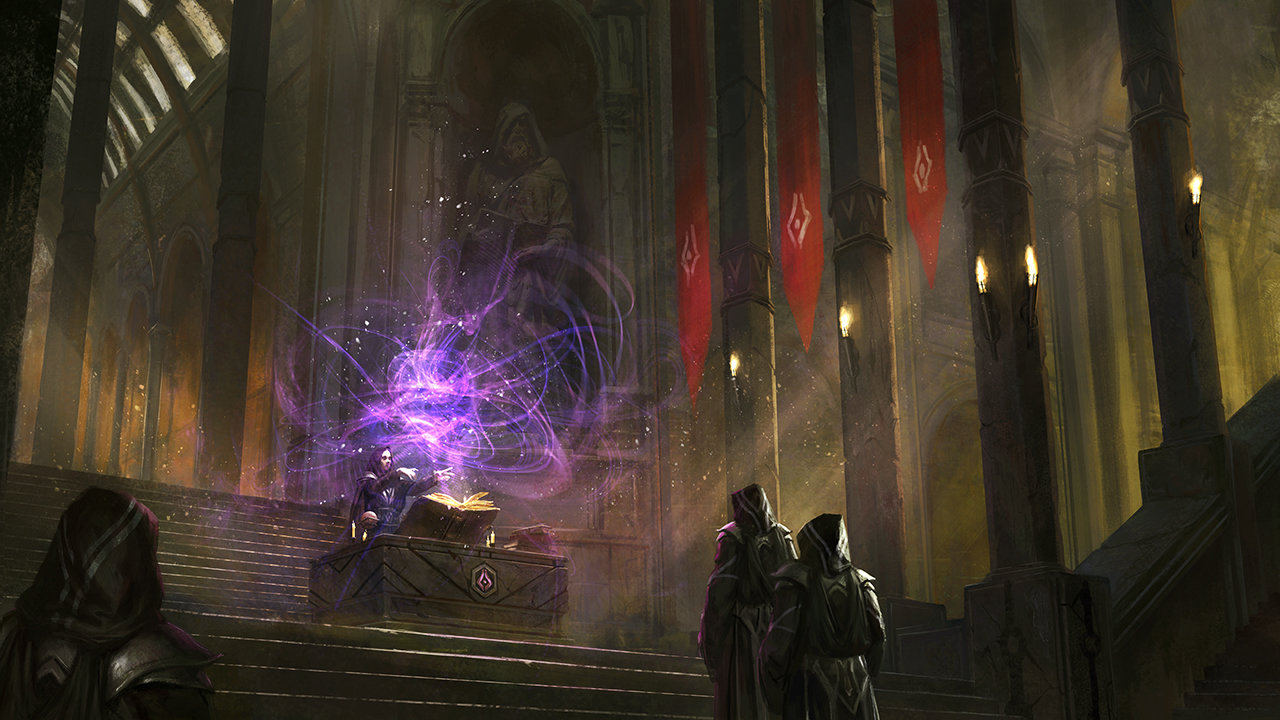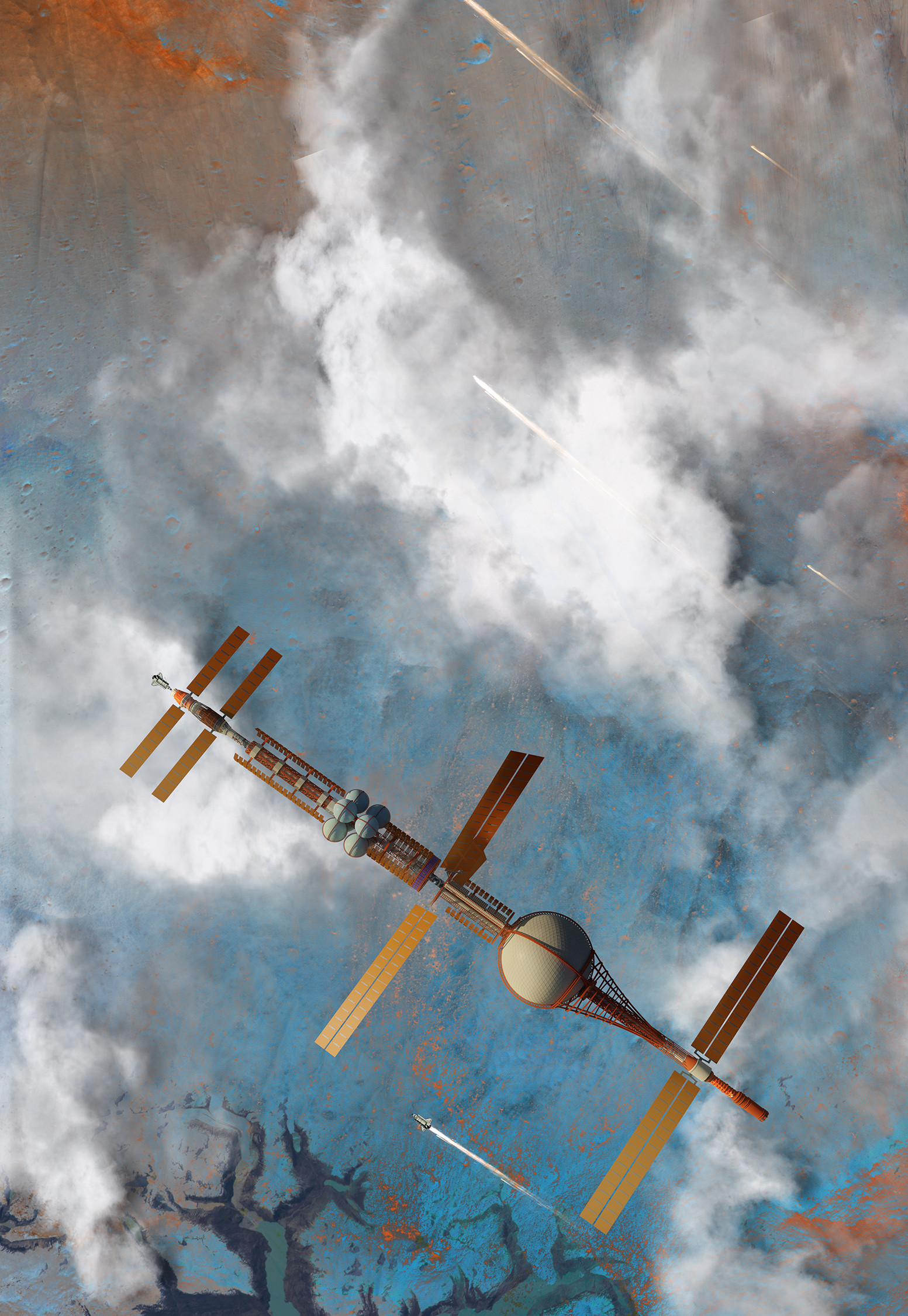I like the spells-as-elementals approach of the GLOG - spells are essentially semi-domesticated animals that take up residence in a wizard's brain and spell formulae are ways to entice spells to roost there. However, my own Egradus setting treats them a little differently, as will Pike & Shotte - due to a reality-warping calamity eons in the past (caused by some apocalyptic, biblical war or a creation of the Divine run amok) energy from the chaotic void that the world/universe was previously shielded against now infiltrates and moves through our reality. Those who are attuned to it can sense and mould this energy into spells, but the process is fraught with danger as the energies of chaos are anathema to an ordered, material universe. Magic Dice represent the amount of power that a wizard can safely use - their mind automatically dampens their powers when too much chaotic energy is channelled through their mind at once.
 |
| Credit, Gal Or |
Class: Wizard
Starting Equipment: spellbook (this can be anything from an actual book a necklace of inscribed bones), writing tools (ink & quill or whatever is appropriate to write down spells). Your school may grant additional items. Take good care of your spellbook - they're expensive (10gp) to replace.
A: +1 MD, +1 Spell Slot, +2 Spells (1-6), Arcana, Book Casting, School of Magic
B: +1 MD, +1 Spell Slot, +1 Spell (1-8), Arcane Study
C: +1 MD, +1 Spell Slot, +1 Spell (1-10), Risky Casting
D: +1 MD, +1 Spell Slot, Master of Magics
Spell Slots
Spell slots represent the spells that you have locked into your mind through a combination of mnemonic tricks, meditation and self-delusion. You can cast them as a regular action on your turn. A spell prepared in a spell slot counts as if it was cast with 1 Magic Dice but you do not expend any dice that show 4-6. Spell slots are safe, but they limit your connection to the arcane as the mind cannot store chaotic energy without limiting it in some way.
I'm not a huge fan of Vancian casting, but I don't mind giving players a few risk-free uses of relatively low-power magic. I think this strikes the right balance with giving wizards flexibility that scales with level while avoiding the 5-minute adventuring day.
School of Magic
When you select your first wizard template you must select a school of magic which governs the spells available to you and the perks and drawbacks of that school, as well as cantrips that are available to you. You cannot change to a new school without a very good reason (this will almost always involve events in play, not downtime).
Arcana
You can attempt to understand and identify magical items. One Round of close examination (touching, sniffing, tasting etc.) allows you to tell if an item is magical or not. One Turn of close examination allows you to make an INT check to learn more about it. For example, if the item in question is a scroll, you successfully identify the spell contained on it. If you are using a laboratory (worth 5,000sp) you will always successfully identify the item.
Potion effects must be determined experimentally: tiny sips of a potion usually give clues to their identity. Sometimes items have properties that can't be identified in the field. They require an arcane library or some scrap of lore. The most powerful artefacts usually require additional work to decipher their latent abilities, and cursed items usually hide their curses, but in both of these cases you will get a sense that there is more to learn after identifying it. If you fail to identify a magical item, you cannot try again until you have had a chance to visit a library containing arcane lore.
Arnold has this as part of the wider magic rules for the GLOG, but it made sense for me to add it as a wizard class ability.
Book Casting
You can cast spells directly from your spellbook. You must declare you are casting a spell from a book before initiatives are rolled for the turn. You automatically go last in the initiative round, and you must Save if you take damage or you fumble the spell. You can still move normally.
I wanted to give wizards lots of chances to use their powers and avoid the usual Vancian spells-are-one-use-for-some-reason dilemma where by actively being useful a wizard limits their future usefulness until things grind to a halt. Having this ability at first level allows them to contribute a reasonable amount of magic, at least until their Magic Dice run out.
Arcane Study
You can make magic inscriptions, brew potions and create magic vessels.
Any of the above activities takes one week of uninterrupted downtime in an appropriate environment (laboratory, library etc.) as well as costing 1d6gp in commonly available reagents.
You must use materials that are soaked in magical, spiritual or otherwise otherworldly energy when creating something magical. For example - regular parchment can't hold the magic needed to make a magic scroll but the ritually tattooed and tanned skin of a prince, or a spell etched into the scale of a dragon definitely could. Likewise a regular length of wood is entirely unsuited for use as a magic vessel, but the finger of a treant, or the petals of a lily that grows in a magic spring would be perfect for a vessel or potion base, respectively.
Inscriptions are one-use instances of a spell - when they are cast the inscription crumbles to ash and adds an extra Magic Die to the spell effects. A spellcaster can invest additional Magic Dice if they so choose. Thus, scrolls can be cast by anyone (even non-spellcasters) if they have been identified and are legible.
Potions distil the essence of a spell into liquid form. It takes an action to drink a potion and the effects take place immediately. Like inscriptions, potions provide one Magic Dice to the spell effects. However, this is a flat addition and cannot be increased (it's hard to cast spells while drinking). The nature of the spell will usually make the effect of the potion obvious, but if not then consult your GM.
Vessels are a physical containers for spells, i.e. a magic wands or staves. A vessel has an Integrity rating based on how long the base material was exposed to magic - roll 1d100, the result is the number of years exposed for an organic material, and decades for an inorganic one. Imbuing a spell into a vessel decreases its integrity by 2d10 years/decades. When creating the vessel you must confirm how many Magic Dice you are contributing to it - these dice are automatically expended until the next day. The vessel has this many Magic Dice that can be used to cast the spell contained within, and you can contribute extra Magic Dice to the casting. When you attempt to use the vessel you must roll under its Integrity on a d100, adding 10 to your roll for each of your own Magic Dice that you added. Success means that the spell casts as normal, failure means the vessel loses d100 integrity and you suffer a Mishap. If a vessel is reduced to 0 Integrity it is destroyed in an explosion of barely constrained chaos.
The above is adapted from Logan Knight's excellent Last Gasp Grimoire spellcaster rules. I wanted to avoid making magic scrolls and the like too easy to obtain. I think restricting the base materials to something inherently magical works well to ensure rarity, and acquiring magical materials could form a quest in and of itself. It also makes magical wares expensive if a party somehow finds a place that sells potions and the like.
Risky Casting
Once per day, you can re-use Magic Dice that have been exhausted for the day. You must Save or suffer a Mishap, if you didn't roll one. Resolve Doom results as normal.
Master of Magics
Learn up to 6 spells from your school’s spell list, or invent an entirely new spell (GM’s discretion).
Thanks for the last one, Skerples.
Thanks for the last one, Skerples.
 |
| Credit, Sean Andrew Murray |
I'll be thinking up some wizard backgrounds in the future, but I really wanted to get this down and set for now. I'll make a master post for these things at some point.

No comments:
Post a Comment